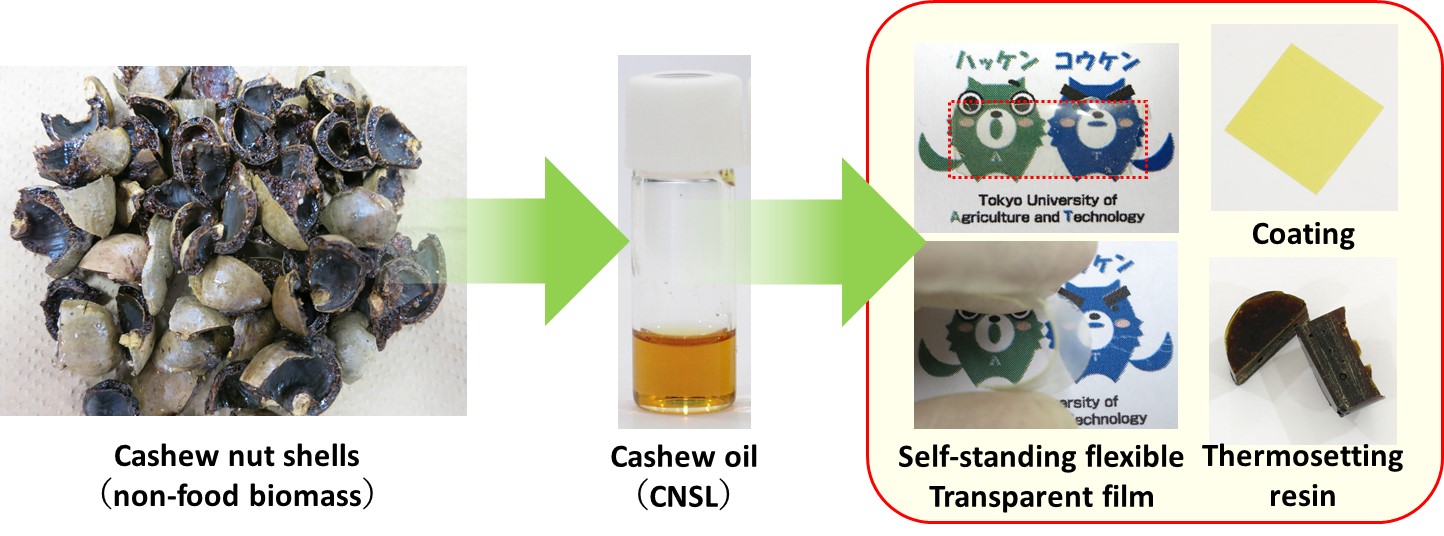Development of bioplastics derived from non-food cashew nut shell liquid (CNSL)
October 5, 2017
Assistant Professor Shinji Kanehashi and Professor Kenji Ogino (Division of Applied Chemistry, Institute of Engineering, Tokyo University of Agriculture and Technology) and Emeritus Professor Tetsuo Miyakoshi (Meiji University) developed novel room temperature-curable green plastics derived from non-food cashew nut shell liquid (CNSL) that industrial wastes without any toxic and/or harmful chemicals (e.g., formaldehyde, heavy metal catalyst, volatile organic compounds (VOC), etc) to environment and human. This green plastic has several unique features such as good film/resin processability, thermal resistance, chemical stability (acid, base, and organic solvent), antimicrobial property for Escherichia coli and Staphylococcus aureus. Therefore, this green plastic can be expected for the application to packaging, coating, resins as functional structure materials. This research was presented on May 29-31 in 66th The Society of Polymer Science, Japan (SPSJ) Annual Meeting@ Makuhari Messe, Chiba.
Our daily life has been becoming more comfortable and convenient owing to the many functional polymer materials. However, most of these materials are derived from oil and require large amounts of energy to produce. Recent global warming based on increase in carbon emissions is one of the serious environmental concerns. Therefore, establishment of green sustainable society for global environment is most important from such global environmental concerns. The use of environmentally-friendly renewable resources such as plant and non-food materials for making functional polymer materials (i.e., bio-based polymer or green plastics) is one solution for addressing such environmental problems.
Cashew nut shell liquid (CNSL) is a non-food natural oil that can be extracted from cashew nut shells. In the present work, novel organic solvent-free bio-based polymers was prepared from CNSL by epoxidation, oxidation and crosslinking with amine compounds. This bio-based polymer can be formed at room temperature as a film, coating, and resin. This polymer is thermally stable up to 300°C, and chemically stable under the presence of acid, base, and organic solvents. Further, antimicrobial activities for Escherichia coli and Staphylococcus aureus were observed. Therefore, this bio-based polymer could be useful in antibacterial materials as a coating and resin for health care applications.
This bio-based polymer was prepared from natural CNSL without any toxic and/or harmful chemicals (e.g., formaldehyde, heavy metal catalyst, volatile organic compounds (VOC), etc) to environment and human. The polymers have a good processability that can be formed at room temperature as a film, coating, and resin. Therefore, this bio-based polymer can be expected for the application to packaging, coating, adhesive, and resins as functional structure materials.

Related Information
TUAT research factors (English): http://www.rd.tuat.ac.jp/en/activities/factors/index.html
Press release (Japanese): ナッツの殻から機能性材料の開発に成功~植物由来の環境調和型グリーンプラスチックを開発~(PDF:376KB)
Contact
Shinji Kanehashi
Assistant Professor, Division of Applied Chemistry, Institute of Engineering,
Tokyo University of Agriculture and Technology
Tel +81- 42-388-7212
Email kanehasi(insert @ symbol here)cc.tuat.ac.jp
